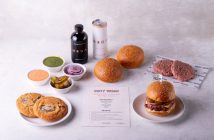The last time you are likely to have read about super-chef Marcus Wareing was in 2008 during his much publicised battle with long-standing friend and business partner, Gordon Ramsay, as Marcus weaved his way out of Ramsay Holdings in a bid to acquire the site of his restaurant at The Berkeley Hotel in Knightsbridge. It was a bitter struggle involving a complex game of legal chess, but Marcus emerged victorious with his two Michelin stars and more importantly retaining the keys to his restaurant – formerly Petrus – that would be renamed Marcus Wareing at The Berkeley.
Things have moved on since those turbulent days and 2010 sees a new Marcus Wareing, a revitalised and philosophical man with a spring in his step who is looking forward to what the future holds for his business, his family and the industry at large. Hailed by critics and peers alike as one of the most talented chefs in the UK, Marcus speaks his mind and he speaks from the heart. There may be an f-word or three in there, but what you get from Marcus is honesty. I went to meet this Lancashire lad over a pre-service coffee to talk about life, the universe and everything.
Marcus is a Chef Patron who spends more time in his restaurant than anywhere else; I arrived at 10am and he emerged from the kitchen in chef’s whites, having already been there for two hours. “The day always begins with getting into the kitchen as soon as I possibly can. I don’t feel comfortable joining the team later in the morning or at midday like a chef in my position should do. I’m one of those guys who has to get out of bed, get here, beat the rush hour, beat the cooks. I’m just like that, I don’t know why. Even though I could be completely exhausted and I know that I could lie in bed until one minute to twelve and drive my car here for half-past twelve and not have missed the service, it just doesn’t work for me. So generally I’m in the kitchen by 8 o clock.”
Professional kitchens often come under fire for being harsh places to work, from Pierre Koffmann’s menacing management style to Marco Pierre White’s infamously eccentric antics to Gordon’s red-faced effing and blinding. Yet the early fine dining ‘brigades’ were constructed around a military set-up and this format works very well in a business that is geared around precise timing in a high-stress environment. But there does need to be an element of good mentoring involved.
”I’m a great believer in leading by example. I’ve got a young team and they’ve all been with me for a long time, especially at senior level. There’s stability in the kitchen brigade. As much as the kitchen staff probably think this is a hard place to work, they get a solid grounding and a CV with a great name at the end of it, but they also get great training. I do talk to them, I do listen to them. I even give the one right at the bottom of the ladder my time. Because they are the future and they are the ones that I want to carry on the legacy, whether it’s with me or just catering in general. It’s a real big plus for me.”
It’s a longstanding debate that if a top chef puts his name above the door then he should be present in his own kitchen. I ask Marcus if this is important to him, though I have already guessed the answer. “Absolutely, one-hundred percent. I think it was like that in the olden days and I think it’s like that in the modern world. When Marco was at Harveys, he was there everyday, Gordon at Aubergine was there everyday, and yeah they’ve gone on to do other things and that’s a good thing – you can take Gordon’s restaurant on Royal Hospital Road for example – I don’t think the food there is any worse than if he was there. He’s got it absolutely fine tuned, he’s very happy and he maintains three Michelin stars. But what’s really interesting is that the recession has changed peoples’ view on where they go and how they spend their money, and what people are looking at now is value. They might be prepared to spend a little bit more, but what they’re not going to do is spend it on a mediocre brand. They want to know that they’ll get the quality for the pound they’re spending, and when you put your name above the door and they walk into the kitchen and you’re there, they think, yep, I get that now. It’s worth every penny. We ate everything, we enjoyed everything and we go into the kitchen at the end of the night and f**k me he’s there!”
Marcus recently appeared on a BBC documentary about the Michelin Guide, where a certain food critic attempted to dress a plate to Wareing’s liking; and failed miserably. This was a good demonstration of the high standards these chefs work to, yet the documentary portrayed super-chefs like Marcus who strive for Michelin perfection as oddballs for wanting such excellence in their cooking. “I felt with the TV show that to say I’m a bit kooky because I want to work sixteen hours a day and get a bit finicky with the food was unfair. This is the one fine dining passion that I have, I don’t want to work in a place that flips steaks and does chips, and that’s why I come to work and work the hours I do, and believe it or not I actually enjoy it. It’s what I want and it’s what my clients want. The Michelin Guide is a very well respected guide with a huge amount of history, they are legendary and they will be for another one-hundred years.”
With such a dynamic business that requires his full attention, Marcus still finds the time to dedicate to his family who provide strength and inspiration for him. “We have a great family and a fabulous lifestyle, I see my children as much as anyone in the City, or as much as any other successful man sees their family. I do get to see them at weekends and I did see them this morning. I just won’t put them to bed. I never saw my father like that; when I woke up he was never there, when I went to bed he was never there. But I never look back bitterly towards him, I admire him.”




